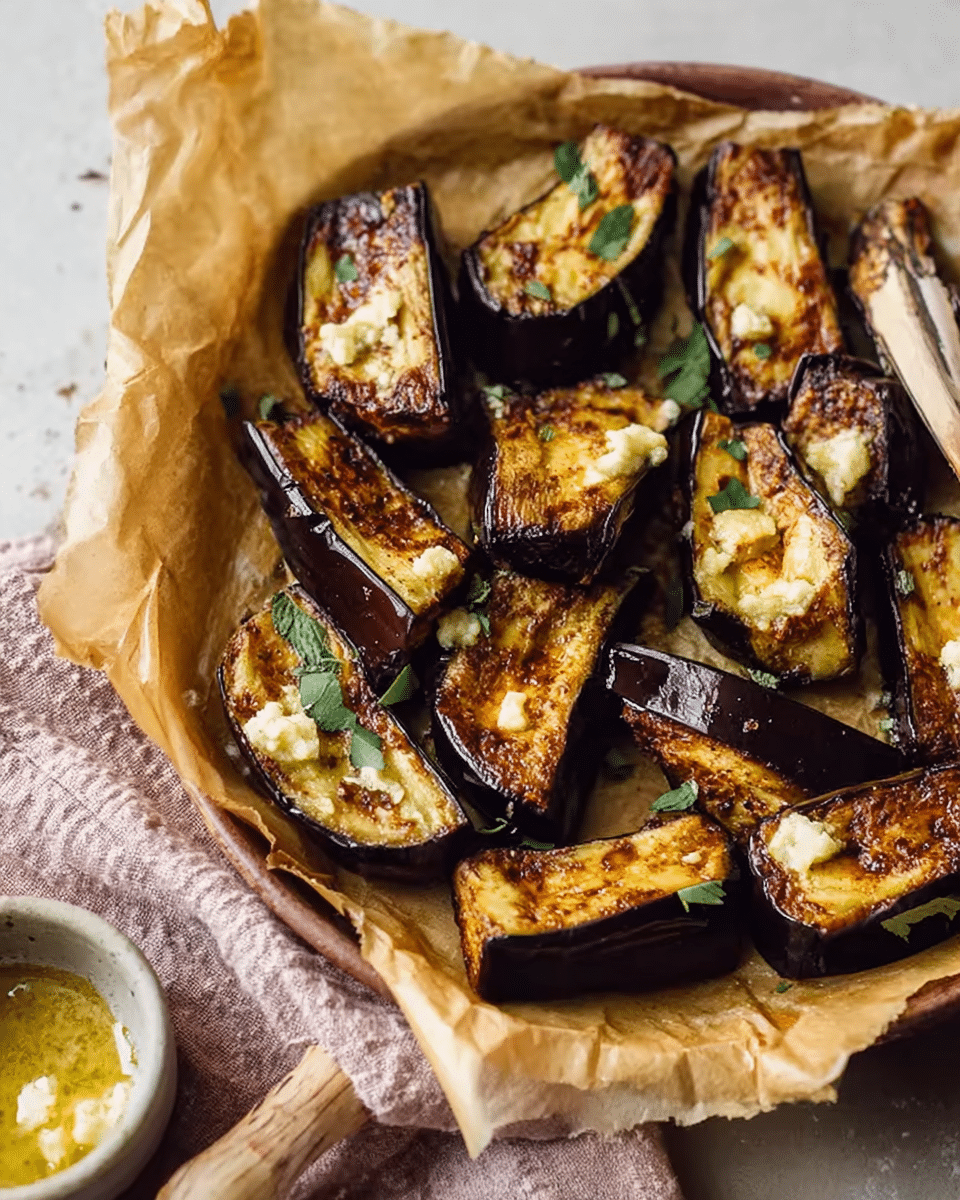This oven-roasted eggplant is the perfect blend of tender, creamy inside with a caramelized, crispy exterior. It’s a simple, flavorful way to prepare eggplant in just 30 minutes with minimal ingredients. Whether as a side dish, in wraps, salads, pasta, or bowls, roasted eggplant is versatile and delicious. This recipe will change your perception of eggplant forever!
Full Recipe:
Ingredients
-
1 medium eggplant (about 4 cups cubed or 400g)
-
2 tbsp olive oil
-
½ tsp sea salt
Directions
-
Preheat the Oven: Preheat your oven to 425°F (218°C) and line a baking sheet with parchment paper.
-
Prepare the Eggplant: Trim the ends of the eggplant and cut it into ½ to 1-inch cubes.
-
Toss with Oil and Salt: Place the cubed eggplant on the prepared baking sheet. Drizzle with olive oil and sprinkle with salt. Toss to coat the eggplant evenly.
-
Roast: Roast in the center of the oven for 25-30 minutes, tossing halfway through, until the eggplant is tender and lightly browned on the outside.
-
Serve: Enjoy immediately as a side, in wraps, on salads, or tossed with pasta.
Nutrients
-
Calories: 85 kcal (per ½ cup serving)
-
Carbohydrates: 5.9g
-
Protein: 0.9g
-
Fat: 6.9g
-
Saturated Fat: 1g
-
Polyunsaturated Fat: 0.8g
-
Monounsaturated Fat: 4.9g
-
Cholesterol: 0mg
-
Sodium: 294mg
-
Potassium: 229mg
-
Fiber: 3g
-
Sugar: 3.5g
-
Vitamin A: 23 IU
-
Vitamin C: 2.2 mg
-
Calcium: 9.7 mg
-
Iron: 0.3 mg
Why Oven-Roasted Eggplant is So Delicious
Eggplant can sometimes be a tricky vegetable to prepare, often becoming soggy or overly oily. However, when roasted, eggplant takes on a whole new level of flavor. The exterior becomes crispy and golden-brown, while the inside remains soft and creamy, almost like a silky puree. This contrast in textures is one of the reasons oven-roasted eggplant is so enjoyable.
The process of roasting enhances the natural sweetness of eggplant, which, when paired with just a drizzle of olive oil and a sprinkle of sea salt, creates a simple yet flavorful dish. The heat from the oven caramelizes the sugars in the eggplant, giving it a rich, savory taste. As the eggplant cooks, it absorbs the olive oil, becoming beautifully tender while still maintaining its structure. This results in a dish that is both satisfying and versatile.
The Versatility of Roasted Eggplant
Oven-roasted eggplant is incredibly versatile and can be used in a variety of ways. It can serve as a side dish to complement a main course or be used as an ingredient in other dishes like wraps, salads, pasta, or grain bowls. Its mild flavor makes it a perfect base for soaking up dressings, sauces, and seasonings, which adds to its adaptability.
In wraps, roasted eggplant can be paired with hummus, fresh vegetables, and a drizzle of tahini for a light and healthy meal. For salads, it can be combined with greens, feta cheese, and a tangy vinaigrette, adding a satisfying texture and depth of flavor. Tossed with pasta, roasted eggplant provides a hearty bite, and its savory notes complement tomato-based sauces perfectly. Additionally, it can be incorporated into grain bowls with quinoa or rice, offering a filling and nutritious component.
Roasted eggplant also shines when paired with Mediterranean ingredients like olives, garlic, and fresh herbs. Its versatility is one of the reasons it has become a staple in many cuisines around the world, from Middle Eastern dishes to Italian and Mediterranean recipes.
The Health Benefits of Roasted Eggplant
Eggplant is not only delicious but also offers a variety of health benefits. It’s a low-calorie vegetable, making it a great option for those looking to maintain or lose weight. A half-cup serving of roasted eggplant contains only 85 calories, making it a healthy addition to any meal.
In addition to being low in calories, eggplant is a good source of fiber, which is essential for digestive health. A serving of roasted eggplant provides about 3 grams of fiber, which helps promote healthy digestion, regulate blood sugar levels, and keep you feeling full longer.
Eggplant is also packed with important vitamins and minerals. It contains small amounts of vitamin A, which is essential for vision and immune function, and vitamin C, which helps support the immune system and skin health. Additionally, eggplant contains potassium, which is important for maintaining healthy blood pressure and supporting heart function.
The antioxidants in eggplant, particularly nasunin, which is found in the skin, have been shown to protect cells from damage caused by free radicals. These antioxidants contribute to the vegetable’s anti-inflammatory properties, promoting overall health and well-being.
The Simplicity of Roasting Eggplant
One of the most appealing aspects of this recipe is its simplicity. All you need are a few basic ingredients: olive oil, sea salt, and of course, the eggplant. The roasting process is straightforward—simply cube the eggplant, toss it with olive oil and salt, and bake until golden brown and tender. It’s a hands-off method of cooking, allowing you to focus on preparing other parts of your meal while the eggplant roasts in the oven.
Roasting eggplant at a high temperature, around 425°F, allows for the caramelization of the sugars in the eggplant, which results in the crispy exterior that many people love. The process only takes 25-30 minutes, making it a quick and easy way to enjoy the vegetable.
Additionally, the roasting process enhances the eggplant’s natural flavor without the need for complex seasonings or ingredients. While this recipe keeps it simple with just olive oil and sea salt, you can always add garlic, herbs, or a squeeze of lemon juice after roasting to customize the flavor profile to your liking.
How to Prepare Eggplant for Roasting
Before you start roasting eggplant, it’s important to properly prepare the vegetable. Begin by trimming off both ends of the eggplant, as these parts can be tough and bitter. Then, cut the eggplant into ½ to 1-inch cubes. This size ensures that the eggplant cooks evenly and that each piece has enough surface area to become crispy and golden-brown in the oven.
One common issue people face when cooking eggplant is its tendency to absorb a lot of oil. However, when preparing this recipe, the olive oil is added in just the right amount to coat the eggplant evenly without making it greasy. It’s also a good idea to toss the eggplant halfway through roasting to ensure that all sides are evenly cooked and caramelized.
If you prefer, you can sprinkle the eggplant with additional seasonings like garlic powder, dried herbs, or a dash of smoked paprika for added flavor. However, the simplicity of this recipe with just olive oil and sea salt allows the natural flavor of the eggplant to shine through.
Roasted Eggplant as a Meal Prep Option
Oven-roasted eggplant is an excellent option for meal prep, as it keeps well in the refrigerator for several days and can be easily reheated. After roasting, simply allow the eggplant to cool, then store it in an airtight container in the fridge for up to 3-4 days. You can quickly reheat it in the oven or even in a skillet on the stovetop to restore some of its crispiness.
Roasted eggplant can be added to your weekly meal prep for use in a variety of dishes. For example, it can be prepped at the beginning of the week and incorporated into lunch bowls, tossed with pasta, or added to a salad throughout the week. Its versatility makes it a great addition to many meals, and it’s a convenient way to ensure you have a healthy, flavorful option on hand during the week.
Serving Suggestions for Oven-Roasted Eggplant
Oven-roasted eggplant is incredibly versatile and can be paired with a wide range of dishes. It makes an excellent side dish to accompany grilled meats, seafood, or vegetarian entrees. Roasted eggplant pairs particularly well with Mediterranean and Middle Eastern dishes, such as grilled lamb, falafel, or tabbouleh. It also works wonderfully in wraps or pita pockets, where it can be combined with hummus, tahini, fresh vegetables, and herbs for a light, flavorful meal.
For a more substantial dish, roasted eggplant can be added to pasta dishes, either as a topping or mixed into the sauce. Its soft, creamy texture complements tomato-based sauces, and it also pairs well with pesto or olive tapenade for a Mediterranean-inspired pasta.
You can also serve roasted eggplant in grain bowls, combined with quinoa, rice, or couscous, along with other roasted vegetables, chickpeas, or a protein of your choice. It’s a great way to create a balanced and nutritious meal that’s both filling and flavorful.
Why You Should Add Roasted Eggplant to Your Menu
Roasted eggplant offers a simple yet incredibly satisfying way to enjoy this versatile vegetable. Whether you’re cooking for a family dinner, meal prepping for the week, or looking for a healthy and flavorful side dish, oven-roasted eggplant is a great option. Its tender, creamy inside and crispy, caramelized exterior make it a crowd-pleaser, and its versatility allows it to be incorporated into a variety of dishes.
Additionally, eggplant is a nutritious vegetable that provides fiber, vitamins, and antioxidants, making it a healthy choice for any meal. When roasted, it takes on a rich, savory flavor that can be customized with various seasonings or enjoyed on its own. Roasted eggplant is a fantastic way to elevate your meals and add a burst of flavor to your menu.
Conclusion
In conclusion, oven-roasted eggplant is a simple, flavorful, and versatile dish that is perfect for a variety of occasions. With minimal ingredients and easy preparation, it’s a great way to enjoy this nutritious vegetable. Whether served as a side, in wraps, salads, pasta, or bowls, roasted eggplant offers a satisfying contrast of textures and flavors that will have you coming back for more. Its ability to absorb flavors while retaining its creamy texture makes it a versatile addition to many dishes. Once you try it, you’ll likely find that this method of preparing eggplant quickly becomes a staple in your kitchen.






